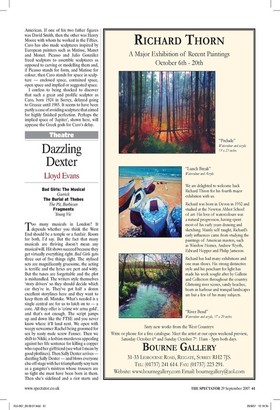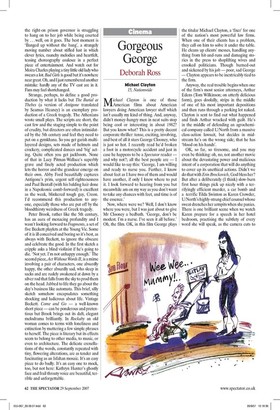Dazzling Dexter
Lloyd Evans Bad Girls: The Musical Gan-ick The Burial at Thebes The Pit, Barbican Fragments Young Vic Too many musicals in London? It depends whether you think the West End should be a temple or a funfair. Room for both, I'd say. But the fact that many musicals are thriving doesn't mean any musical will. Hit shows succeed because they get virtually everything right. Bad Girls gets three out of five things right. The stylised sets are magnificently gruesome, the acting is terrific and the lyrics are pert and witty. But the tunes are forgettable and the plot is mishandled. The writers style themselves 'story drivers' so they should decide which car they're in. They've got half a dozen excellent storylines here and they want to keep them all. Mistake. What's needed is a single central arc for us to latch on to — a core. All they offer is `crimz wiv artsa gold', and that's not enough. The script jumps up and down like the FTSE and you never know where it'll land next. We open with weepy newcomer Rachel being groomed for sex by nasty male screw Fenner. Then we shift to Nikki, a lesbian murderess appealing against her life sentence for killing a copper who raped her girlfriend (see what I mean by good plotlines). Then Sally Dexter arrives — dazzling Sally Dexter — and blows everyone else off stage with her triumphantly sexy turn as a gangster's mistress whose trousers are so tight she must have been born in them. Then she's sidelined and a riot starts and the right-on prison governor is struggling to hang on to her job while being courted by ... well, on it goes. The best moment is 'Banged up without the bang', a strangely moving number about stifled lust in which clever lyrics, raunchy melodies and heartfelt, teasing choreography coalesce in a perfect piece of entertainment. And watch out for Moira Charles playing a tiny little old lady who swears a lot. Bad Girls is good but it's nowhere near great. Oh, and I just remembered another mistake: hardly any of the TV cast are in it. Fans may feel shortchanged.
Strange, perhaps, to define a good production by what it lacks but The Burial at Thebes (a version of Antigone translated by Seamus Heaney) is an exemplary production of a Greek tragedy. The Athenians wrote small plays. The scripts are short, the cast few and the staging simple to the point of crudity, but directors are often intimidated by the 5th century and feel they need to put on a gymkhana. So you get garish multilayered designs, sets made of helmets and crockery, complicated dances and 'big' acting. Quite often you get jackboots. None of that in Lucy Pitman-Wallace's superbly grave and finely acted production which lets the horror and the grandeur emerge on their own. Abby Ford beautifully captures Antigone's prim, urgent self-righteousness and Paul Bentall (with his balding hair done in a Napoleonic comb-forward) is excellent as the weak, blinkered tough guy, Creon. I'd recommend this production to anyone, especially those who are put off by the bloodthirsty weirdness of Greek tragedy.
Peter Brook, rather like the 5th century, has an aura of menacing profundity and I wasn't looking forward to Fragments, a set of five Beckett playlets at the Young Vic. Some of it is ill conceived and boring so it's best, as always with Beckett, to ignore the obscure and celebrate the good. In the first sketch a cripple asks a blind violinist if he's going to die. 'Not yet. I'm not unhappy enough.' The second piece,Act Without Words II, is a mime involving a pair of characters, one absurdly happy, the other absurdly sad, who sleep in sacks and are rudely awakened at dawn by a silver rod that falls from the sky to prod them on the head. Jabbed to life they go about the day's business like automata. This brief, silly sketch somehow encapsulates something shocking and ludicrous about life. Vintage Beckett. Come and Go — a well-known short piece — can be ponderous and pretentious but Brook brings out its daft, elegant melodrama brilliantly. In Rockaby an old woman comes to terms with loneliness and extinction by muttering a few simple phrases to herself. The piece is literary but its effects seem to belong to other media, to music, or even to architecture. The delicate crenellations of the words, constantly repeated with tiny, flowering alterations, are as tender and fascinating as an Isfahan mosaic. It's an easy piece to do badly. It's an easy one to mock, too, but not here: Kathryn Hunter's ghostly face and frail throaty voice are beautiful, terrible and unforgettable.
























































 Previous page
Previous page